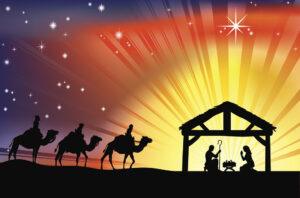
What About Easter?
Easter for the year 2021 was celebrated and observed on Sunday, April 4th. Easter, also called Resurrection Sunday or Pascha is one of the most important days in the Christian faith commemorating the resurrection of Jesus Christ from the dead according to the New Testament. The Easter Triduum or Paschal Triduum starts on the evening of Maundy Thursday with the last supper continuing through Good Friday and the crucifixion and burial of Jesus Christ into Holy Saturday and ending with prayers on the evening of Easter Sunday. The day is the beginning of the Eastertide season and the end of Lent (40 days of fasting and prayer starting on Ash Wednesday ending on Holy Saturday) and Holy Week that started on Palm Sunday and lasts 7 days through to Holy Saturday. Although it is not a federal holiday, many stores are closed or operate minimal hours on this day to give believers an opportunity to worship.
Why is Christmas Important?
The LIFE that ended with His crucifixion, death, burial and His resurrection from the dead, began as the Baby in a manger. Christmas is a Christian holiday to celebrate the birth of Jesus, the central figure of Christianity. Most Christians celebrate the holiday on December 25, but it is celebrated on January 7 in the Orthodox Church due to the use of a different calendar. Christmas is also widely observed in secular (nonreligious) ways.
The origin of Christmas is the “Christ mass” or the yearly church gathering in which the birth of Jesus was celebrated. The Bible offers many reasons for why believers celebrate the birth of Jesus as the true meaning of Christmas.
First, the birth of Jesus fulfilled many Old Testament prophecies. Isaiah 7:14 notes, “Therefore the Lord himself will give you a sign. Behold, the virgin shall conceive and bear a son, and shall call his name Immanuel.” Isaiah 9:6 adds, “For to us a child is born, to us a son is given; and the government shall be upon his shoulder, and his name shall be called Wonderful Counselor, Mighty God, Everlasting Father, Prince of Peace.”
Second, the birth of Jesus marked God coming to live among His people. John 1:14 shares, “And the Word became flesh and dwelt among us, and we have seen his glory, glory as of the only Son from the Father, full of grace and truth.” The One who made all things came and walked among humanity: “For by him all things were created, in heaven and on earth, visible and invisible, whether thrones or dominions or rulers or authorities—all things were created through him and for him” (Colossians 1:16).
Third, the birth of Jesus served as part of God’s redemption. Jesus came to earth, lived, died, and rose again to offer eternal life to all who believe (John 3:16). After His resurrection He ascended to heaven (Acts 1:6-11), waiting to return once again for His people (1 Thessa-lonians 4:13-18).
What about Hanukkah?
In the New Testament, Jesus was at the Jewish temple at the Feast of Dedication (another name for Hanukkah): “At that time the Feast of Dedication took place at Jerusalem. It was winter, and Jesus was walking in the temple, in the colonnade of Solomon” (John 10:22-23). It appears Jesus celebrated Hanukkah as part of participating in Jewish life and customs.
But should Christians celebrate Hanukkah today? While it may be especially appropriate for Christians from a Jewish background to celebrate this holiday, there is nothing inappropriate from a biblical perspective for a Gentile Christian to celebrate Hanukkah. Neither is there a biblical command for either Jewish background or Gentile background believers to celebrate Hanukkah. The apostle Paul offered much insight regarding the personal convictions that can be applied in the celebration of special days (Romans 14:5-6).
Jesus called Himself the light of the world: “I am the light of the world. Whoever follows me will not walk in darkness, but will have the light of life” (John 8:12).
Our highest goal as believers is to follow Him and to share this Light of the world with others.
In 2022, Easter will fall on April 17.
Blessings, Sandra